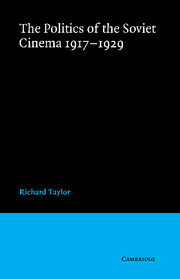Book contents
- Frontmatter
- Contents
- Preface
- Acknowledgements
- Note on transliteration
- Abbreviations
- 1 The pre-history of the Soviet cinema
- 2 The Bolsheviks, propaganda and the cinema
- 3 Revolution and Civil War
- 4 The disorganisation of organisation: the early twenties
- 5 The organisation of disorganisation: the later twenties
- 6 The Party takes control
- 7 Theory and film
- 8 Conclusions
- Notes
- Bibliography
- Index
6 - The Party takes control
Published online by Cambridge University Press: 07 October 2011
- Frontmatter
- Contents
- Preface
- Acknowledgements
- Note on transliteration
- Abbreviations
- 1 The pre-history of the Soviet cinema
- 2 The Bolsheviks, propaganda and the cinema
- 3 Revolution and Civil War
- 4 The disorganisation of organisation: the early twenties
- 5 The organisation of disorganisation: the later twenties
- 6 The Party takes control
- 7 Theory and film
- 8 Conclusions
- Notes
- Bibliography
- Index
Summary
Although we all share Lenin's view that the cinema is the most important agitational and propaganda weapon for influencing the masses, we have nonetheless hitherto allowed this art form to drift on the Soviet sea ‘rudderless and without sails’…The forthcoming conference will work out a ‘single’ platform for the ‘unification of the socialist state with the cinema on proletarian foundations’.
Soviet cultural journal, 1927.Sovkino had not had to wait long before it, like Goskino before it, became the butt for general criticisms of the weaknesses in the organisation of the Soviet cinema. But to a considerable extent Sovkino became a scapegoat because official cultural policy was changing. The end of the New Economic Policy, and the period of reconstruction associated with it, meant, as far as the Party was concerned, that the material base for the transition to socialism had now been achieved and that attention could therefore be concentrated on ideological matters and in particular on an emphasis on the leading rôle of the working class in cultural affairs. This change in attitude was signalled by the resolution adopted by the Central Committee on 18 June 1925 concerning Soviet literature: ‘Leadership in the field of literature belongs to the working class …There is not yet a hegemony of proletarian writers’ The exact nature of the ‘proletarian cultural revolution’ that was to accompany the economic revolution of the Five Year Plan was to be decided in a series of Party conferences on the arts. The last of these conferences was that on the cinema, held in Moscow after some delay from 15 to 21 March 1928.
- Type
- Chapter
- Information
- The Politics of the Soviet Cinema 1917–1929 , pp. 102 - 123Publisher: Cambridge University PressPrint publication year: 1979

